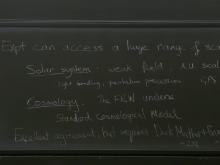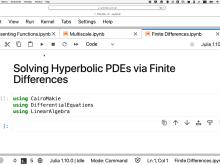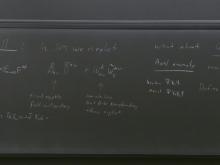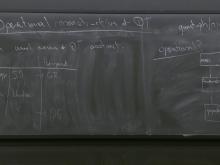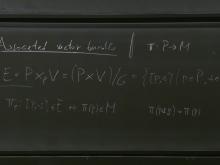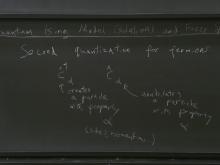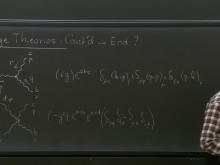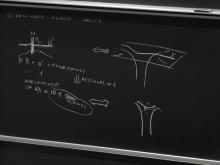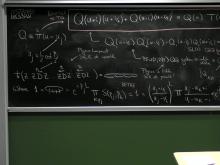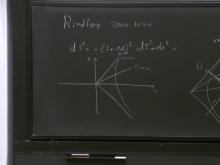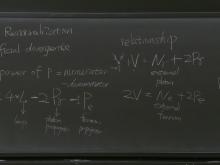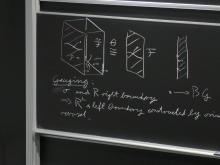Format results
-
13 talks-Collection NumberC24007
Talk
-

Gravitational Physics Lecture - Zoom Only
Ruth Gregory King's College London
-

-

-

-

-

-

-

-
-
Numerical Methods 2023/24
13 talks-Collection NumberC24004Talk
-
Standard Model 2023/24
13 talks-Collection NumberC24006Talk
-
Quantum Foundations
13 talks-Collection NumberC24008Talk
-

Quantum Foundations Lecture
Lucien Hardy Perimeter Institute for Theoretical Physics
-

Quantum Foundations Lecture
Lucien Hardy Perimeter Institute for Theoretical Physics
-

Quantum Foundations Lecture
Lucien Hardy Perimeter Institute for Theoretical Physics
-

Quantum Foundations Lecture
Lucien Hardy Perimeter Institute for Theoretical Physics
-

Quantum Foundations Lecture
Lucien Hardy Perimeter Institute for Theoretical Physics
-

Quantum Foundations Lecture
Lucien Hardy Perimeter Institute for Theoretical Physics
-

Quantum Foundations Lecture
Lucien Hardy Perimeter Institute for Theoretical Physics
-

Quantum Foundations Lecture
Lucien Hardy Perimeter Institute for Theoretical Physics
-
-
Mathematical Physics - Core 2023/24
12 talks-Collection NumberC24005Talk
-
Statistical Physics 2023/24
14 talks-Collection NumberC23046Talk
-

Statistical Physics Lecture - 111423
Emilie Huffman Perimeter Institute for Theoretical Physics
PIRSA:23110026 -

Statistical Physics Lecture - 111523
Emilie Huffman Perimeter Institute for Theoretical Physics
PIRSA:23110027 -

Statistical Physics Lecture - 111723
Emilie Huffman Perimeter Institute for Theoretical Physics
PIRSA:23110028 -

Statistical Physics Lecture - 112023
Emilie Huffman Perimeter Institute for Theoretical Physics
PIRSA:23110029 -

Statistical Physics Lecture - 112223
Emilie Huffman Perimeter Institute for Theoretical Physics
PIRSA:23110030 -

Statistical Physics Lecture - 112423
Emilie Huffman Perimeter Institute for Theoretical Physics
PIRSA:23110031 -

Statistical Physics Lecture - 112723
Emilie Huffman Perimeter Institute for Theoretical Physics
PIRSA:23110032 -

Statistical Physics Lecture - 112923
Emilie Huffman Perimeter Institute for Theoretical Physics
PIRSA:23110033
-
-
Quantum Field Theory 2 2023/24
14 talks-Collection NumberC23045Talk
-
Twisted Holography Mini-Course
6 talks-Collection NumberC23050Talk
-

Twisted Holography Mini-Course - Lecture 20231102
Kevin Costello Perimeter Institute for Theoretical Physics
-

Twisted Holography Mini-Course - Lecture 20231109
Kevin Costello Perimeter Institute for Theoretical Physics
-

Twisted Holography Mini-Course - Lecture 20231116
Kevin Costello Perimeter Institute for Theoretical Physics
-

Twisted Holography Mini-Course - Lecture 20231123
Davide Gaiotto Perimeter Institute for Theoretical Physics
-

Twisted Holography Mini-Course - Lecture 20231130
Davide Gaiotto Perimeter Institute for Theoretical Physics
-

Twisted Holography Mini-Course - Lecture 20231214
Davide Gaiotto Perimeter Institute for Theoretical Physics
-
-
Quantum Spectral Curve and Three Point Functions mini-course
5 talks-Collection NumberC23049Talk
-

3pt function: No Q's
Pedro Vieira Perimeter Institute for Theoretical Physics
-

Q-functions in spin chains. QSC for spin chains
Paul Ryan King's College London
-

QSC definition in N=4
Paul Ryan King's College London
-

An explicit solution
Paul Ryan King's College London
-

3pt functions: Yes Q's
Pedro Vieira Perimeter Institute for Theoretical Physics
-
-
Relativity 2023/24
14 talks-Collection NumberC23043Talk
-
Quantum Field Theory 1 2023/24
13 talks-Collection NumberC23044Talk
-
Topological Quantum Field Theories - mini-course
9 talks-Collection NumberC23048Talk
-

Topological Quantum Field Theories Lecture 20231006
Lukas Mueller Perimeter Institute for Theoretical Physics
-

Topological Quantum Field Theories Lecture 20231013
Lukas Mueller Perimeter Institute for Theoretical Physics
-

Topological Quantum Field Theories Lecture 20231020
Lukas Mueller Perimeter Institute for Theoretical Physics
-

Topological Quantum Field Theories Lecture 20231027
Lukas Mueller Perimeter Institute for Theoretical Physics
-

Topological Quantum Field Theories Lecture 20231103
Lukas Mueller Perimeter Institute for Theoretical Physics
-

Topological Quantum Field Theories Lecture 20231110
Lukas Mueller Perimeter Institute for Theoretical Physics
-

Topological Quantum Field Theories Lecture 20231124
Lukas Mueller Perimeter Institute for Theoretical Physics
-

Topological Quantum Field Theories Lecture 20231201
Lukas Mueller Perimeter Institute for Theoretical Physics
-
-
Gravitational Physics
13 talks-Collection NumberC24007The Gravitational Physics course takes your knowledge and practice of gravity to the next level. We start by recapping the essential elements of differential geometry, adding some new techniques to the toolbox, then apply some of these methods to learning about submanifolds, extra dimensions, and black hole thermodynamics. Towards the end of the course, we delve into the frontiers, with a sample of recent research topics.
-
-
Standard Model 2023/24
13 talks-Collection NumberC24006The Standard Model of particle physics is introduced, and reviewed, from a modern effective field theory perspective.
-
-
Mathematical Physics - Core 2023/24
12 talks-Collection NumberC24005This course will introduce you to some of the geometrical structures underlying theoretical physics. Previous knowledge of differential geometry is not required. Topics covered in the course include: Introduction to manifolds, differential forms, symplectic manifolds, symplectic version of Noether’s theorem, integration on manifolds, fiber bundles, principal bundles and applications to gauge theory.
-
-
-
Twisted Holography Mini-Course
6 talks-Collection NumberC23050This mini-course will introduce twisted holography, which is holography for BPS subsectors of gauge theory and gravity. We will start by introducing the B-model topological string from the space-time perspective, before discussing branes, backreaction, and the holographic duality.
Zoom: https://pitp.zoom.us/j/98839130613?pwd=SExFK0ZVYzJ3NmJhU1RFa21PWU1qQT09
-
Quantum Spectral Curve and Three Point Functions mini-course
5 talks-Collection NumberC23049In this mini-course we will describe some recent integrability developments in N=4 SYM. Pedro will start with some overview of three point functions in this theory. Paul will introduce the powerful Quantum Spectral Curve formalism describing the full planar spectrum of N=4 SYM starting with some elementary spin chain introduction. In this formalism, each operator in the theory is governed by a (set of) Q-function(s). In his last lecture Paul will walk us through an explicit example from beginning to end of a QSC solution. Pedro will then describe some explorations on three point correlation functions in this theory. The goal would be to have a machine where three Q-functions are given as input and a three-point function is spit out as output. We will describe where we are in this quest.
No Zoom link or hybrid participation available. Registration is not required.
-
-
-
Topological Quantum Field Theories - mini-course
9 talks-Collection NumberC23048A quantum field theory is deemed topological if it exhibits the remarkable property of being independent of any background metric. In contrast to most other types of quantum field theories, topological quantum field theories possess a well-defined mathematical framework, tracing its roots back to the pioneering work of Atiyah in 1988. The mathematical tools employed to define and study topological quantum field theories encompass concepts from category theory, homotopy theory, topology, and algebra.
In this course, we will delve into the mathematical foundations of this field, explore examples and classification results, especially in lower dimensions. Subsequently, we will explore more advanced aspects, such as invertible theories, defects, the cobordism hypothesis, or state sum models in dimensions 3 and 4 (including Turaev-Viro and Douglas-Reutter models), depending on the interests of the audience.
Today, the mathematics of topological quantum field theories has found numerous applications in physics. Recent applications include the study of anomalies, non-invertible symmetries, the classification of topological phases of matter, and lattice models. The course aims to provide the necessary background for understanding these applications.
